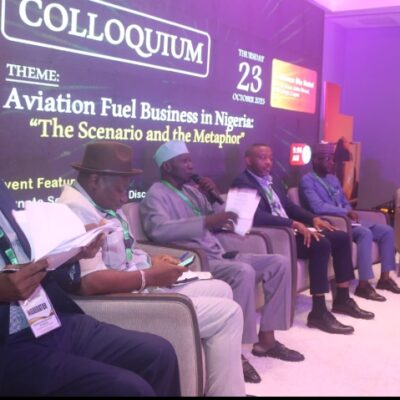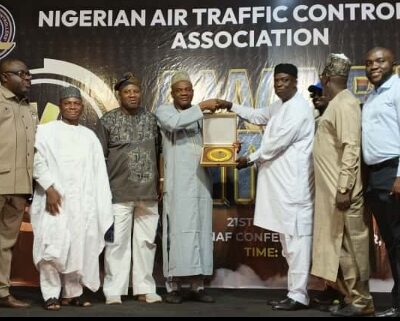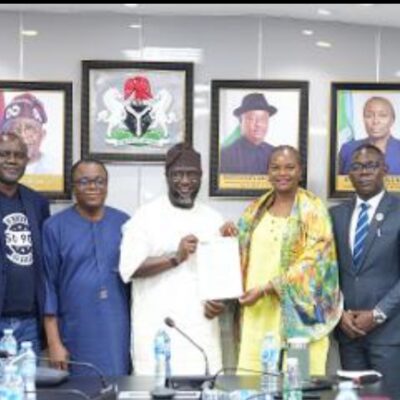BY OLAPEJU OLUBI
In a stirring address that blended wit, candor and patriotic fervor, industry veteran Captain Augustine Inyang Okon, Chairman of Avifuel Limited, has called for a complete overhaul of Nigeria’s aviation fuel market, urging policymakers and industry players to anchor the Jet A-1 supply chain to local refining capacity and abandon the country’s crippling dependence on foreign exchange.
Delivering his paper titled
“Opinion Poll on the Aviation Fuel Market in Nigeria” at the CITA Energies Colloquium held in collaboration with LAAC in Lagos, Okon said that the nation stood on the threshold of an aviation fuel revolution — one that could redefine cost structures, improve efficiency, and restore confidence across the aviation value chain.
Speaking on the theme “Aviation Fuel Business in Nigeria – The Scenario and the Metaphor,” he likened the industry’s fuel dilemma to “flying through turbulent airspace without a clear radar,” and called on stakeholders to “trust Nigeria’s own engine.”
“The aviation fuel market is the invisible engine behind our skies,” Okon said.
“Without Jet A-1, airplanes are just beautifully painted sculptures parked on the tarmac. Yet for too long, this market has been shrouded in clouds of uncertainty — rising costs, forex pressure, import dependence, and erratic supply.”
He explained that while the scenario of Nigeria’s aviation fuel market is deeply economic and logistical, the metaphor is emotional — about trust, hope, and the dream of a self-reliant aviation industry.
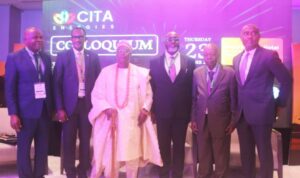
“When I received the invitation to speak on this topic, I smiled. Because in our business, opinions on aviation fuel are like weather reports — everyone has one, and they change faster than the wind at Murtala Muhammed on a wet rainy day,” he began.
Okon’s so-called “opinion poll” was not a statistical exercise but an extensive listening tour across hangars, depots, and boardrooms.
He distilled his findings into what he described as “the four voices of the industry”: airlines, marketers, regulators, and passengers — all speaking from different corners of the same storm.
He observed that Nigerian airlines today operate with one eye on the sky and the other on the fuel gauge. “Fuel now takes up nearly half of their operating cost,” he revealed.
“Prices swing wildly because they are pegged to the dollar — yet revenues are earned in naira. One airline executive told me recently, ‘Captain, every time the naira coughs, our engines sneeze.’”
For marketers, Okon said the situation is equally turbulent. They are often perceived as profiteers, yet many are struggling under thin margins, scarce foreign exchange, and mounting airline debts. “Their complaints are valid,” he noted.
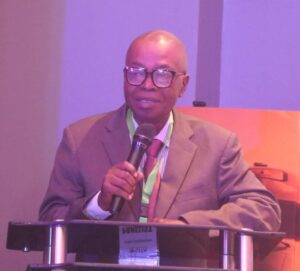
“Margins are thin, logistics are costly, and debts pile up like rubbish bins at Agege. But behind their frustration lies optimism — they believe that the arrival of local refining will finally change the weather pattern.”
Regulators, he said, continue to speak with cautious assurance, citing policy reforms and the entry of the Dangote Refinery as signs of hope.
“They say, ‘Help is on the way,’ and indeed for once, we can see light through the clouds,” Okon remarked. “But the industry expects more — speed, coordination, and enforcement. It’s not enough to announce policy; we must fuel it into motion.”
He also gave voice to passengers, describing them as “the silent shareholders in the aviation ecosystem.”
To them, the rising cost of fuel is not an abstract market issue but a daily reality reflected in high ticket prices, flight delays, and cancellations.
“If you stop ten passengers at Lagos Airport today and ask what they think of aviation fuel,” he said,
“most would shrug and say, ‘All we know is that flight prices keep going up.’ And they’re right.”
Reflecting on the collective sentiment of the industry, Okon said most stakeholders are anxious but cautiously hopeful.
“If this were a real opinion poll,” he mused, “60 percent of the voices would be worried, 25 percent cautiously hopeful, 10 percent skeptical, and 5 percent eternal optimists — those who believe Nigeria can and will fuel its own future. I count myself proudly among that five percent.”
He hailed the recent milestone achieved by the Dangote Refinery, noting that its commencement of aviation fuel exports has the potential to transform Nigeria’s energy narrative.
“That single development changes our entire flight plan. It means we no longer have to fly abroad to refuel. The storm clouds of dependency are beginning to clear,” Okon said.
However, he warned that true transformation would only come when policy aligns with patriotism.
“Let Nigeria sell crude to Dangote in naira,” he proposed. “And in turn, let Dangote sell aviation fuel to Nigerian airlines in naira-based prices. That single act will drastically reduce the foreign exchange component of our airlines’ operations and strengthen the naira from the inside out. This, colleagues, is not just an economic reform — it is a patriotic flight path.”
Okon stressed that Nigeria must move from “flying by dead reckoning” to a structured and strategic approach to aviation fuel management.
He urged stakeholders to build transparent pricing systems, establish a Joint Aviation Fuel Board involving the NNPC, NCAA, airlines, and marketers, and modernize fuel storage and pipelines through public-private partnerships.
He also emphasized the need to prepare for the next phase of global aviation — green energy and sustainable aviation fuel. “The world is moving toward energy independence and green flight,” he said. “Nigeria must not be left taxiing on the runway.”
Closing his speech with emotion and conviction, Capt. Okon appealed to both government and private sector players to seize this defining moment for the nation.
“Our skies are wide, our people are capable, and our fuel is finally homegrown.
“Let the story of Nigeria’s aviation fuel market no longer be a metaphor for turbulence, but a symbol of takeoff — national takeoff.
When our airlines buy Jet A-1 in naira, when our refineries run on local crude, and when our passengers feel the benefit in affordable, reliable air travel, then we will have achieved flight-level stability as a nation,” he declared.
He ended with a powerful metaphor that drew a standing ovation: “Every pilot knows that takeoff is optional, but landing is mandatory. Nigeria’s aviation fuel market has taken off many times on wings of policy announcements.
It’s time we landed safely — on the runway of self-reliance. After all,” he concluded with a smile, “you cannot fly far without trusting your own engine.”
Captain Augustine Inyang Okon, a respected aviator, entrepreneur, and now a self-described farmer, is the Founding Chairman and CEO of ADC Airlines, Chairman/CEO of Fresh Air Limited, CEO of Safe Air Academy, and Chairman of Avifuel Limited.
His voice remains one of the most authoritative in Nigeria’s aviation sector — steady, experienced, and still committed to helping the nation find its wings.
Olapeju is a journalist and aviation reporter.


